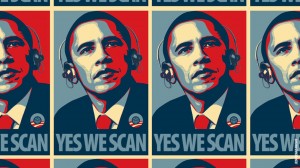The Internet is now built on mass surveillance
Brought to light in recent months, the Edward Snowden-powered NSA leaks have publicized the wholesale spying efforts by US and UK intelligence agencies that undermine the very fabric of the Internet – turning it into a vast surveillance program previously dreamed of by the likes of the KGB and Stasi.
However, they are not the only agencies that have tracked our digital footprint. Whether we admit it to ourselves or not, we’re being pretty much tracked 24/7 online. The Internet is a surveillance state.
Total Information Awareness
The fact that the US is spying on global communications is not entirely new. Back in 2002, a government-funded program called Total Information Awareness aimed at directly storing all email and web traffic, credit card history and medical records, before depositing them for future data mining purposes. At the time it triggered a civil backlash, with many web users describing it as the workings of an Orwellian future, eventually leading to the program being de-funded.
However, if you look back on what Total Information Awareness was trying to achieve, Google has already accomplished it. In fact, Google have exceeded the original scope of what T.I.A. dreamed to collect and process on a global scale. One thing they have really excelled at, and how they have made their money, is through their ability to ‘mine the mosaic’ out of personal data.
Whilst Google has a different aim then the NSA, trying to sell advertising, let’s be blunt. They are in the surveillance business and they track people online to generate profit. The effect is the same. So why are people so concerned about the surveillance practices of the NSA and not as concerned about corporations such as Google?
The answer comes down to a question of choice. In the words of Bruce Schneier, there would be a public uproar if the government passed a law requiring their citizens to carry a tracking device. Yet we all carry smartphones.
Trends have changed and technology alters society
 You choose to use Google, and you don’t choose to be under surveillance by the NSA and its allies. However, the scope of that choice is narrowing and it’s going to become harder to make that choice, until it becomes a question of participating in society or not.
You choose to use Google, and you don’t choose to be under surveillance by the NSA and its allies. However, the scope of that choice is narrowing and it’s going to become harder to make that choice, until it becomes a question of participating in society or not.
Computers and networks generate transaction data as a byproduct of their operation. The mediated services of Google and others like Apple, Yahoo, Facebook and Amazon that we continuously use in our daily lives to communicate, browse, search and purchase, all generate a large amounts of intensely personal information. Our constant interactions with them allow these companies to exploit our data as an ‘exceptionally profitable’ commodity.
It’s necessary for governments to debate issues of privacy in regards to the amount of data collected on us, and which corporations can collect and use our data. Protections against corporate monopoly abuse need to be put in place, but if the government is involved in online surveillance why would it have motivation to create laws to limit data collection?
This forfeit of online privacy has formed a corporate-government surveillance partnership that allows both sides to benefit and at times evade public scrutiny. As a result information accumulates in distinct places and eavesdroppers like the NSA now move to where that data accumulates, as it’s far easier to subtlety collect all the data from these corporations rather than directly from us.
Can we trust the governments and corporations of the future?
 The commercial data mining of personal information is here to stay; there is just too much money at stake to imagine otherwise.
The commercial data mining of personal information is here to stay; there is just too much money at stake to imagine otherwise.
Whilst Google is not alone exploiting data (Facebook and Amazon have impressive capabilities) no one can match its immense reach into our digital lives. The problem is with online companies looking over your shoulder, you have no idea your information is being shared and what sort of meaning is extracted from your data.
Last week’s NSA leaks portray the latest defeat in online privacy by intelligence agencies. However secretive they may be, they are governed by law and government. Surveillance as part of an economic transaction, on the other hand, creates a novel challenge to self-determination and a very real ability to impact our lives.
Too many wrongly characterize this as an argument about security vs. privacy, however first ask yourself should privacy be up for discussion? Privacy is a value, and this is a question about freedom against control. Any right that we give away now will be harder to take back in the future. We need to look at the historical context and recount the times when governments and corporations have abused power.
